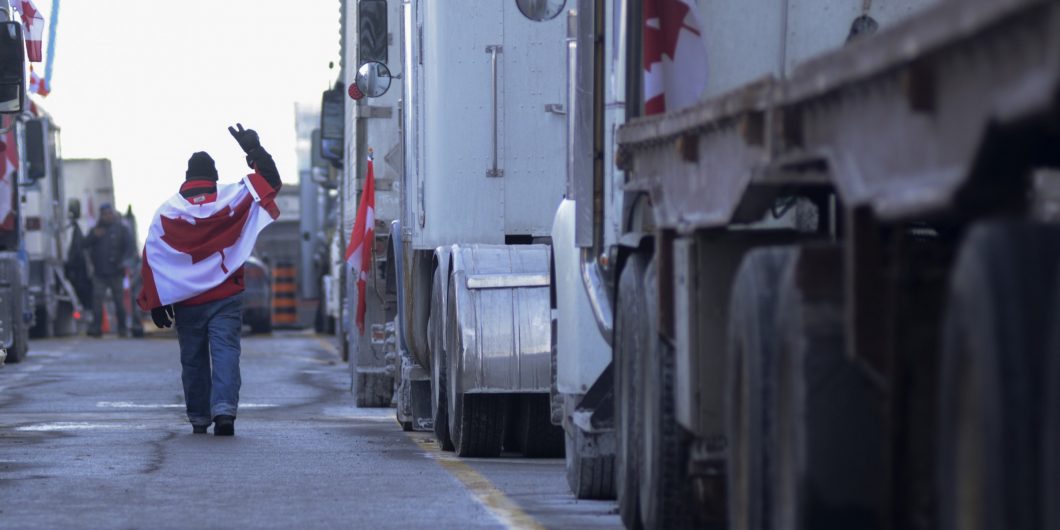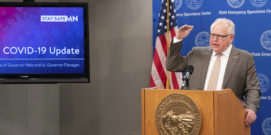Does the text of the Free Exercise Clause justify special judicial scrutiny of laws burdening religious freedom?
What the Truckers Mean for Canada
An outsider could reasonably conclude that Justin Trudeau, with his dandy socks, worldly upbringing, and earnest progressivism—bemoaning the pandemic “she-cession” and touting the “she-covery” (groan)—is a reasonably representative archetype of the Canadian psyche. A friend described Canada’s pandemic posture as “resembling the most alarmist and irrational of America’s blue cities.” It’s a fair summation. For the last two years, we have weathered under some of the world’s longest lockdowns, avoided masking politics, and gotten jabbed (86% of Canadians over age four), without much incident.
And yet the beating heart of Canada has always been the lumberjacks, hockey guys at the ready to break into fisticuffs, and men who drive long nights across Canada’s vast and barren prairies or work in remote camps extracting its rich oil sands. Increasingly, many of these Canadians feel humiliated by the government’s seeming comfort with indefinite restrictions and lockdowns. Their humiliation seems at times to be personified by the mere appearance of Justin Trudeau, who made vaccine mandates a wedge issue in his fall 2021 federal election campaign, peddling divisive rhetoric about the unvaccinated and blaming them for the never-ending pandemic.
One of Trudeau’s most enduring qualities has always been his ability to telegraph empathy. But during the campaign, he made a clear determination to convey his allegiance with the vaccinated majority and scapegoat the unvaccinated minority (who, in turn, showed up to disrupt his various campaign stops with protests).
During the 2021 campaign, the phenomenon of a populist dissenting faction was beginning to emerge in the People’s Party of Canada (PPC), a right-wing party founded on restrictionist immigration rhetoric by a former Conservative Party leadership candidate, Maxime Bernier. During the 2021 campaign, though, the PPC campaigned exclusively as the anti-lockdown, anti-vaccine mandate party. It tripled its share of the popular vote from 1-2% to around 6%. Interestingly, the PPC was picking up votes from across all demographic lines and parties, both left and right. The party still has not won a single seat in Parliament, but its impact is apparent.
All of these tensions were long-simmering when, in January 2022, the attacks against the vaccine-hesitant began to ratchet up in the wake of the Omicron wave. Trudeau went on television in French to declare anti-vaxxers to be racist and misogynist. Then, in Canada’s second-most populous province of Quebec, Premier Francois Legault took the shocking step of declaring the unvaccinated would be subject to a mandatory “health contribution” tax, an egregious assault on Canada’s cherished universal health care system.
The final straw was Trudeau’s announcement that truck drivers on cross-border routes, previously exempt from vaccine mandates and quarantine requirements as essential workers, would now be required to be vaccinated in order to re-enter Canada from the US. Given the infinitesimal risk posed by truck drivers who ride alone in their cabs, the about-face was rubbing salt in the wound. Here were the men who continued to work and expose themselves to the virus while the rest of us hunkered down, buoyed by an endless stream of Amazon Prime and Uber Eats deliveries. Our vaunted essential workers were now being brought to heel. Like the gilets jaunes and their grievances over fuel tax which metastasized into a larger protest against France’s elites, the trucker vaccine mandate was the last big push in the steamroll against freedoms in this country, this time with a distinct class element.
I was acutely aware of all of this, and yet I didn’t see the revolt coming. Normalcy bias is a real thing. Canada is a wealthy, permissive, pluralistic country, cocooned in the security compact of a world superpower which we view as our existential insurance policy. The current protests, from the perspective of stupefying politicians with a glaring problem, are quite simply unprecedented in this country.
The rise of meme culture all but guaranteed some spillover of American polarization and right-wing populism into Canada, however. There is nothing in our social fabric that renders us immune from it. Indeed, the trucker protests represent perhaps the most unambiguous example of a true global populist movement: Canada takes its cue from the world and the world takes its cue from Canada. Protesters in Toronto and Ottawa were seen touting “TRUMP WON” flags and MAGA hats, and the seemingly novel idea of pulling up to the curb of legislative buildings in big rigs has already spread to New Zealand, Australia, France, and Israel. A truck convoy from California to DC is planned this month.
This same normalcy bias, no doubt, has paralyzed the Ottawa police for the last two and a half weeks. Expecting an ordinary weekend protest, they utterly failed to prevent an ongoing occupation. By many reports, the Ottawa siege has uncommonly sharp teeth. Several of its organizers are ex-army and Mounties, trained in weaponry and assault tactics. They have allegedly set up a walled-off “staging area” in an Ottawa baseball stadium parking lot where they deploy logistics and distribute funds to keep the trucks fuelled and truck drivers fed. They are calling for the resignation of Trudeau, the dissolution of Parliament, and the formation of a new coalition.
The momentum of the protests may have sped up the timetables of some provinces in unwinding restrictions. Alberta, Saskatchewan, Ontario, and Quebec have all announced they would be imminently removing restrictions.
Ottawa Chief of Police Peter Sloly announced a week into the occupation that he did not believe there was a policing solution that could end the occupation. He resigned on Tuesday. The Ottawa police are badly outnumbered, and local civilian towing companies refuse to tow any of the estimated 400 trucks that have stationed themselves in the downtown core out of a combination of fear of reprisal and sympathy with the cause. The truckers are both intransigent in their dedication to the cause and tactically competent. None of their explicit demands will be met, of course. But polls do show Trudeau’s popularity waning, and there will be significant political reverberations.
The fallout of the protests has been swift in some circles. The Conservative Party wielded an as-yet unexercised legislative process to vote no confidence in its leader Erin O’Toole, who had run as a true blue conservative but hewed to the centre in the federal election, as all Canadian conservatives must do to appeal to suburban Ontario voters and win enough seats to govern Parliament. (He failed to make any gains.) In the wake of the protest, O’Toole’s equivocation on lockdowns and mandates was intolerable.
The pugilistic MP Pierre Poilievre, who delivered extemporaneous remarks to the press decrying the hypocrisy of elites in supporting Black Lives Matter protests but accusing the truckers of being Nazi sympathizers, immediately emerged as the favourite to replace O’Toole and is reported to be more popular among PPC supporters than its own leader Bernier, suggesting the Conservative Party’s revamp might eliminate the PPC. His candidacy announcement video on Twitter got 4 million views in its first 24 hours.
Trudeau’s own Liberal Party showed some dissension in its ranks, too. Quebec MP Joël Lightbound gave a press conference critiquing the Trudeau government’s divisive rhetoric on vaccinations, and urged the government to keep in mind the fact that “not everybody can earn a living from a MacBook at the cottage.” Canada’s Parliament, unlike the United Kingdom’s, features strict caucus discipline, so an outspoken MP is an extraordinary phenomenon. Lightbound resigned as chair of the Quebec Caucus shortly after making his comments.
Across the country, the momentum of the protests may have sped up the timetables of some provinces in unwinding restrictions. Alberta, Saskatchewan, Ontario, and Quebec have all announced they would be imminently removing restrictions, including vaccine passports, mask mandates, and capacity limits.
Trudeau himself has been almost entirely missing in action apart from a few brief appearances in Question Period and what few remarks he has made have doubled down on his outright condemnation of the “small fringe minority.”
He emerged on Monday to declare a national state of emergency by invoking the Emergencies Act for the first time in Canadian history. But Trudeau has so far failed to explain how the basic statutory requirements of invoking a national emergency have been met by largely peaceful and nonviolent protests. His government also laid out disturbing new “follow the money” rules, including directing banks to freeze funds and accounts suspected to be connected to the protests without a court order and absolving the banks of civil liability.
In the meantime, the rank hypocrisy amongst Canada’s legacy media and chattering class is on full display. They have called the protests white supremacist: indeed, a few Confederate flags, Swastikas, and anti-Semitic signs could be seen during the first weekend of protests. One journalist on site, however, reported that other protestors condemned a despicable anti-Semitic sign and told its bearer to leave, suggesting these people are outliers.
The same individuals who were dovish on police responses to the blockading railroads in winter 2020 and the burning of churches throughout Canada in summer 2021 following the discovery of graves at Indigenous residential schools are demanding Trudeau send in the military.
And last week, in a disconcerting precedent, an Ontario court approved a request from the government to freeze over $8 million USD in donations to the convoy given through the American-based donation platform GiveSendGo, on the grounds that the funds were likely to be tied to criminal activities. The basis of the order is a police report that is not disclosed, perhaps because it is tied to confidential sources. Still, it’s difficult to imagine that the entire $8 million could reasonably be tied to a crime with any degree of specificity. One can only imagine the outrage if such an amount were seized from a progressive protest.
It’s not clear how this affair ends, but a few things seem likely: the movement’s sheer vigour will inject a dose of populist energy into the Conservative Party of Canada in the short and long term, which is calling for an end to both the protests as well as to the vaccine mandates. The delusion that Canada is immune to vicious polarization will end, and our country will have serious questions to reckon with about our capacity to enforce law and order.



